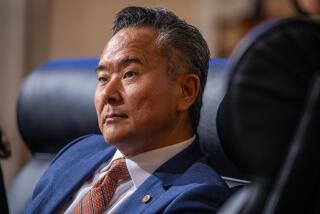Ethics Chief Hits Meese Investment : ‘Blind Partnership’ With Wedtech Consultant Questioned
- Share via
WASHINGTON — The government’s chief ethics officer has sharply criticized Atty. Gen. Edwin Meese III for establishing an unapproved “blind partnership” with a financial consultant to the scandal-plagued Wedtech Corp., it was disclosed Tuesday.
David H. Martin, director of the U.S. Office of Government Ethics, charged in a letter that Meese’s $60,000 investment in a limited partnership with W. Franklyn Chinn in 1985 was never cleared by Martin’s office and thus failed to meet the requirements of federal ethics statutes that are designed to prevent conflicts of interest among high government officials.
Martin’s letter was released Tuesday by Rep. Gerry Sikorski (D-Minn.), chairman of the House Post Office and Civil Service subcommittee on human resources, which oversees the application of federal ethics rules.
Sikorski, who had requested Martin’s opinion of Meese’s previously disclosed trust arrangement, called Martin’s response “further evidence of a pattern of poor judgment and a frightful collapse of ethics within the attorney general’s office.” He said his subcommittee plans to conduct a hearing on the case later this month.
Not in Violation
Donald Campbell, an attorney in the ethics office, said Meese is not deemed to be in violation of federal ethics laws. However, he said that “no way was this even a vague attempt at setting up” a type of blind trust that would be approved by his office, which is an independent federal agency.
But Terry Eastland, a Justice Department spokesman for Meese, said that “there are differences in interpretation over the Ethics in Government Act,” adding that Meese believes he has complied with both the letter and spirit of the law. Eastland, a spokesman for Meese, said the release of Martin’s letter was “a purely partisan attack.”
Eastland said the attorney general established the financial arrangement two years ago “to comply with the Ethics in Government Act and, beyond that, with the spirit of ethics that obligates government officials.”
He said Meese noted the arrangement on his annual financial disclosure form filed last year but never received any official word from the ethics office involving its propriety. “This is the first time that we have heard of the Office of Government Ethics taking any issue with that filing,” Eastland said.
Firm Under Investigation
Under the blind trusts required by ethics regulations, a public official places his assets in the hands of an independent manager who makes all investment decisions without informing the official who owns the assets. The arrangement is designed to keep the official unaware of his holdings to prevent him from taking any governmental action to benefit them.
Wedtech, a New York defense contractor, has been under scrutiny by Justice Department prosecutors in New York and Baltimore, as well as by an independent counsel in Washington, on charges that the firm bribed public officials and gave large consulting fees and stock to politically well-connected lawyers to obtain favoritism in the award of government defense contracts.
Earlier this year, after Chinn’s role surfaced as a financial consultant and director of Wedtech, Meese announced that he was withdrawing funds he had invested with Chinn’s San Francisco-based Financial Management International Inc.
In his financial disclosure form, Meese described the arrangement he had with Chinn as a “limited blind partnership” because he never knew how Chinn invested the funds.
However, Martin said this arrangement did not meet standards set up by the ethics office because it did not shield “an executive branch official from being deemed to have knowledge of outside financial interests.”
“Normally, we would certify the format for a blind trust, we would scrutinize the assets involved, and we would take part in the selection and approval of an independent trustee to administer the trust,” Campbell said in an interview. He said Meese never consulted the ethics office about his arrangement.
Meese has said he had been introduced to Chinn by a mutual friend, San Francisco attorney E. Robert Wallach, who represented Meese in 1984 while his financial affairs were under scrutiny by a court-appointed independent counsel. Wallach is under investigation for lobbying Meese to help Wedtech obtain a no-bid Army contract in 1982 that was reserved for minority-owned contractors.
Company Sues Chinn
Chinn, fired earlier this year by the new management of now-bankrupt Wedtech, is being sued by the company on grounds he submitted false invoices to collect consulting fees. Chinn has denied the charges. He also has said through an attorney that he never invested any of Meese’s money in Wedtech.
Four former Wedtech officials have pleaded guilty to bribery and conspiracy charges, and a dozen other persons are under indictment in the spreading scandal, including veteran New York Democratic Congressman Mario Biaggi. More indictments are expected in the coming weeks.
Martin said in his letter that he began an investigation of Meese’s trust this year and alerted the Justice Department to it. He said he abandoned his inquiry after learning that independent counsel James C. McKay, who is investigating Wedtech, had enlarged his probe to include Meese’s financial dealings.
More to Read
Inside the business of entertainment
The Wide Shot brings you news, analysis and insights on everything from streaming wars to production — and what it all means for the future.
You may occasionally receive promotional content from the Los Angeles Times.










